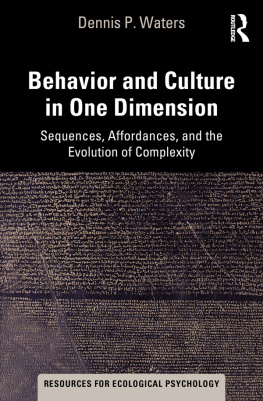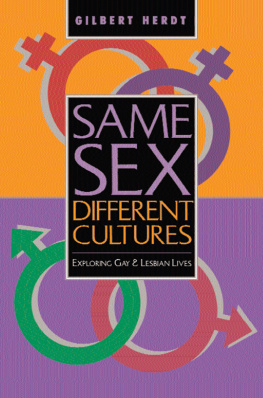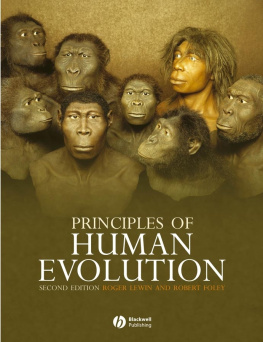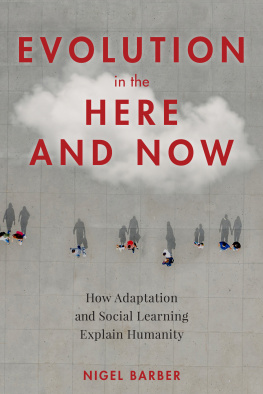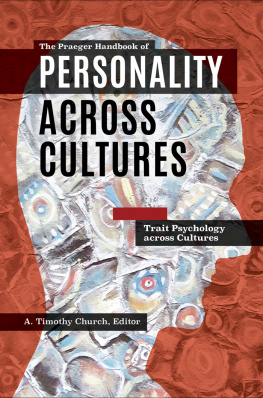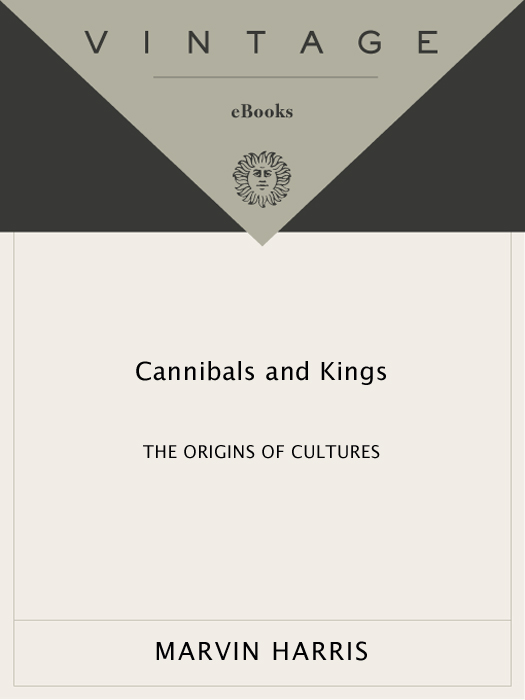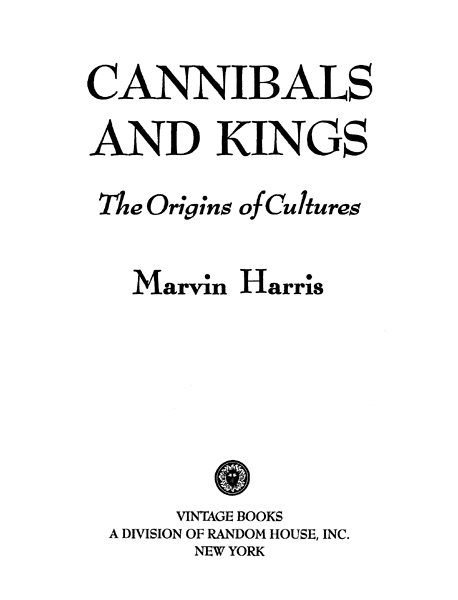VINTAGE BOOKS EDITION, JUNE 1991
Copyright 1977 by Marvin Harris
All rights reserved under International and Pan-American Copyright Conventions. Published in the United States by Random House, Inc., New York, and simultaneously in Canada by Random House of Canada Limited, Toronto. Originally published by Random House, Inc., in October 1977.
Library of Congress Cataloging in Publication Data
Harris, Marvin, 1927
Cannibals and kings.
1. Social evolution. 2. CultureOrigin.
3. ManInfluence of environment. 4. Food supply.
I. Title.
[GN358.H37 1978] 301.2 90-55701
eISBN: 978-0-307-80123-4
v3.1
Contents
Introduction
For centuries the Western world has been comforted by the belief that material progress will never end. We take our cars, telephones, and central heating as proof that living is far easier for us today than it was for our grandparents. And although we recognize that progress may be slow and uneven, with temporary setbacks, we feel that living will, on balance, be a lot easier in the future than it is now.
Scientific theories, for the most part formulated a hundred years ago, nourish this belief. From the vantage point of Victorian scientists, the evolution of culture seemed to be a pilgrimage up a steep mountain from the top of which civilized peoples could look down at various levels of savagery and barbarism yet to be passed by lower cultures. The Victorians exaggerated the material poverty of the so-called savages and at the same time inflated the benefits of industrial civilization. They pictured the old stone age as a time of great fear and insecurity, when people spent their days ceaselessly searching for food and their nights huddled about fires in comfortless caves besieged by saber-toothed tigers. Only when the secret of how to plant crops was discovered did our savage ancestors have enough leisure time to settle down in villages and build comfortable dwellings. And only then could they store surplus food and have time to think and experiment with new ideas. This in turn supposedly led to the invention of writing, to cities, to organized governments and the flowering of art and science. Then came the steam engine, ushering in a new and more rapid phase of progress, the industrial revolution, with its miraculous cornucopia of mass-produced labor-saving machines and life-enhancing technology.
It isnt easy to overcome this kind of indoctrination. Nevertheless, growing numbers of people cant help feeling that industrial society has a hollow core and that despite media images of fun-filled leisure hours our progeny will have to work harder and harder to hold on to the few luxuries we now enjoy. The great industrial cornucopia has not only been polluting the earth with wastes and poisons; it has also been spewing forth increasingly shoddy, costly, and defective goods and services.
My purpose in this book is to replace the old onwards-and-upwards Victorian view of progress with a more realistic account of cultural evolution. What is happening to todays standard of living has happened in the past. Our culture is not the first that technology has failed. Nor is it the first to reach its limits of growth. The technologies of earlier cultures failed again and again, only to be replaced by new technologies. And limits of growth have been reached and transcended only to be reached and transcended again. Much of what we think of as contemporary progress is actually a regaining of standards that were widely enjoyed during prehistoric times.
Stone age populations lived healthier lives than did most of the people who came immediately after them: during Roman times there was more sickness in the world than ever before, and even in early nineteenth-century England the life expectancy for children was probably not very different from what it was 20,000 years earlier. Moreover, stone age hunters worked fewer hours for their sustenance than do typical Chinese and Egyptian peasantsor, despite their unions, modern-day factory workers. As for amenities such as good food, entertainment, and aesthetic pleasures, early hunters and plant collectors enjoyed luxuries that only the richest of todays Americans can afford. For two days worth of trees, lakes, and clear air, the modern-day executive works five. Nowadays, whole families toil and save for thirty years to gain the privilege of seeing a few square feet of grass outside their windows. And they are the privileged few. Americans say, Meat makes the meal, and their diet is rich (some say too rich) in animal proteins, but two-thirds of the people alive today are involuntary vegetarians. In the stone age, everyone maintained a high-protein, low-starch diet. And the meat wasnt frozen or pumped full of antibiotics and artificial color.
But I havent written this book to talk down modern American and European standards of living. No one can deny that we are better off today than were our great-grandparents in the last century. And no one can deny that science and technology have helped to improve the diet, health, longevity, and creature comforts of hundreds of millions of people. In matters such as contraception, security against natural calamities, and ease of transportation and communication, we have obviously surpassed even the most affluent of earlier societies. The question uppermost in my mind is not whether the gains of the last 150 years are real, but whether they are permanent. Can the recent industrial cornucopia be looked upon as the tip of a single continuously rising curve of material and spiritual uplift or is it the latest bubble-like protuberance on a curve that slopes down as often as it slopes up? I think the second view is more in accord with the evidence and explanatory principles of modern anthropology.
My aim is to show the relationship between material and spiritual well-being and the cost/benefits of various systems for increasing production and controlling population growth. In the past, irresistible reproductive pressures arising from the lack of safe and effective means of contraception led recurrently to the intensification of production. Such intensification has always led to environmental depletion, which in general results in new systems of productioneach with a characteristic form of institutionalized violence, drudgery, exploitation, or cruelty. Thus reproductive pressure, intensification, and environmental depletion would appear to provide the key for understanding the evolution of family organization, property relations, political economy, and religious beliefs, including dietary preferences and food taboos. Modern contraceptive and abortion techniques enter this picture as potentially decisive new elements, since they remove the excruciating penalties associated with all preexisting techniques for coping directly with reproductive pressures through fertility control. But the new technology of contraception and abortion may have come too late. Contemporary state societies are committed to the intensification of the industrial mode of production. We have only begun to pay the penalties for the environmental depletions associated with this new round of intensification, and no one can predict what new constraints will be needed to transcend the limits of growth of the industrial order.
I am aware that my theories of historical determinism are likely to provoke an unfavorable reaction. Some readers will be offended by the casual links I point to among cannibalism, religions of love and mercy, vegetarianism, infanticide, and the cost/benefits of production. As a result, I may be accused of seeking to imprison the human spirit within a closed system of mechanical relationships. But my intention is exactly the opposite. That a blind form of determinism has ruled the past does not mean that it must rule the future.


